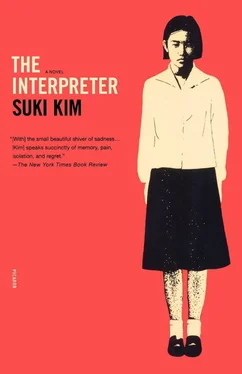Suki Kim - The Interpreter
Здесь есть возможность читать онлайн «Suki Kim - The Interpreter» весь текст электронной книги совершенно бесплатно (целиком полную версию без сокращений). В некоторых случаях можно слушать аудио, скачать через торрент в формате fb2 и присутствует краткое содержание. Город: New York, Год выпуска: 2011, ISBN: 2011, Издательство: Picador, Жанр: Детектив, Триллер, на английском языке. Описание произведения, (предисловие) а так же отзывы посетителей доступны на портале библиотеки ЛибКат.
- Название:The Interpreter
- Автор:
- Издательство:Picador
- Жанр:
- Год:2011
- Город:New York
- ISBN:0-312-42224-5
- Рейтинг книги:3 / 5. Голосов: 1
-
Избранное:Добавить в избранное
- Отзывы:
-
Ваша оценка:
- 60
- 1
- 2
- 3
- 4
- 5
The Interpreter: краткое содержание, описание и аннотация
Предлагаем к чтению аннотацию, описание, краткое содержание или предисловие (зависит от того, что написал сам автор книги «The Interpreter»). Если вы не нашли необходимую информацию о книге — напишите в комментариях, мы постараемся отыскать её.
The Interpreter — читать онлайн бесплатно полную книгу (весь текст) целиком
Ниже представлен текст книги, разбитый по страницам. Система сохранения места последней прочитанной страницы, позволяет с удобством читать онлайн бесплатно книгу «The Interpreter», без необходимости каждый раз заново искать на чём Вы остановились. Поставьте закладку, и сможете в любой момент перейти на страницу, на которой закончили чтение.
Интервал:
Закладка:
With each job, with each endless hour they labored at dry cleaners, liquor stores, fruit-and-vegetable markets, nail salons, delis, truck-delivery service, car service, they seemed to have lost something of themselves, a sort of language with which they had communicated with each other and their daughters. Sure, it could have been the claustrophobia of immigrant life, being stuck in Korean enclaves that remained ignorant of English-speaking America. But there was something deeper. Something terrible that seemed to have haunted both. Something resembling fear that stirred Dad’s rage and Mom’s pointed absence, and always the two girls were made to sit and watch. Everything always came to the same end. The reason was Korea. The final answer was Korea. All of their discontent, their misery, their endless wanderings through the slums of outer New York happened only because they had left their country. The girls were bad girls because they spoke English, rather than their native Korean. The houses they kept moving through were temporary shelters with torn mattresses on the floor, because America could never be home. But of course her parents had no intention of returning to Korea. It was an excuse, Suzy thought. Korea was a crutch. It was what they used to keep the girls on their own terms.
Yet the one thing both Suzy and Grace so desperately wanted was to be American girls, full-fledged American darlings, more golden than the girl next door, even cheerier than the prom queen, definitely sweeter than all-American sweethearts. Far, far away from their parents’ Korea, which stuck to them like an ugly tattoo.
How misguided such a dream: neither even made it to the prom. Dad would never have allowed it, but it did not matter really, for the girls were always new in their high school and had hardly any friends. No boy would have asked Suzy, and the ones Grace knew would have laughed at the idea. Besides, a prom was a luxury at the sort of schools to which they transferred. Most kids came from immigrant homes. No boy could dish out a hundred bucks for a night. No girl looked good in ruffled dresses. Pink satin was for white girls. A limousine? Why hire one when your father’s the cabbie? A prom belonged in those Molly Ringwald movies, in which the prettiest girl, pretending to be a geek, ends up winning the rich, handsome, sensitive football captain for the last dance. High schools, as Suzy knew, had nothing to do with sweet sixteen. You were lucky if you didn’t get mugged on the way to the locker. You were lucky if you didn’t get frisked by the policeman at the gate ready to crack down on drug gangs. The golden girl, the girl next door, the all-American sweetheart didn’t get made in the gutters of Queens.
“Here we are.” The girl turns around, stopping abruptly in the middle of the hallway.
“The prom… when’s your prom?” Suzy blurts out, then quickly regrets it, realizing that this might be too far-fetched for the girl.
“Prom?” asks the girl, her eyes widening.
“No, never mind,” mutters Suzy, finding herself before Grace’s classroom.
It is hard to believe that Grace must be inside. It suddenly occurs to Suzy that she might be too early. 8:50 a.m., not the best time for a surprise visit. But, then, it might even work to her advantage. Grace would have to greet her politely, first thing in the morning, showing up before her entire class. But it would not be fair to walk in on her like that, nor would it be wise. Instead, Suzy suggests, “Could you ask Miss Park to come outside? Tell her someone’s here to see her.” The girl is still vexed by Suzy’s question about the prom but seems relieved that the subject is being dropped. Before disappearing inside, she turns around once, as if making sure Suzy is still there.
A few minutes later, the door opens to reveal the girl, followed by an older woman. Short-waisted and blotchy-skinned, she reminds Suzy of Michael’s secretary, Sandy. Although Suzy has never seen Sandy in person, she imagines Sandy to have a similar look, the nervous look of a woman who’s been on her own too long.
“May I help you? I’m Ms. Goldman,” she says, peering at Suzy as if searching for a clue.
“I’m here to see… Grace Park. Is she not available?” Suzy stammers, barely hiding her disappointment, and a tinge of relief.
“Miss Park, well, she’s not here today.” Ms. Goldman glares at the little girl, as if shooing her away. The girl turns bright red, embarrassed for overstaying her welcome. Then she makes a slight bow in Suzy’s direction and slouches down the hall, glancing back a few times.
“I’m a family member. Is she ill?” Strange that she should say “family member” instead of “sister.” But Suzy cannot bring up the word “sister” with this woman who seems irrelevant, too irrelevant to be standing in Grace’s place.
“Family? I didn’t realize Miss Park had any family.” Ms. Goldman raises an eyebrow, sizing up Suzy. “She’s not ill. She’s gone on vacation.” Obviously Ms. Goldman does not notice the resemblance, unlike Bob out in Montauk. Perhaps Grace was right. Perhaps it is only white men who can’t tell one Asian girl from another. But Suzy is used to this look, this subtle look of disappointment. Often it came from other Korean women. Sisters? They would repeat, scanning Suzy once more, as if they felt sorry for the sibling who fared so poorly, by comparison, in looks.
“A vacation? Did she say for how long?” It is as if Grace knew Suzy was coming, and had slipped away just in time.
“Two weeks, although… well…” Ms. Goldman is about to say something but quickly changes her mind.
“I’ve sort of fallen out of touch with her because… I’ve been away. Do you know where I can find her?” Suzy puts on an apologetic smile. People are suckers for family values. They don’t like to hear about a sibling falling-out. They want reconciliation, and if it takes a slight breach of promise, oh well, it’s all for the good of getting a family back together.
But Ms. Goldman is not so easy. She is not moved by Suzy’s smile, and instead dismisses her with a firm note: “No, I have no idea. I must go back inside now. I’m sorry, I can’t help you.”
And just like that, Suzy is left standing alone in the hallway. Teachers, that’s what she remembers about them. Never answer questions that matter; never give anything away unless they have to. Perhaps Grace had warned her. Perhaps the whole school is hiding Grace from Suzy.
With students gone, the hallway is endless. Eerily quiet, except for the occasional murmur and laughter from classrooms. She would now have to try the administrative office, which is located at the east end of the first floor. Its formidable door opens to a reception area, and another door farther back which leads to the principal’s office. The haphazard state of the desk indicates that someone has only just stepped out. The carpeted sofa feels more plushy than it looks. Suzy is tempted to stretch out, eyeing the stack of newspapers and magazines on the table. The Jersey Journal, Education Today, Child Psychology , some of them dating back to the previous summer. There couldn’t be a duller selection. Resting her head on the cushion, she is about to recline when she notices an odd one sticking out. It is barely a newspaper. A slim volume entitled 1.5 Generation , which is just a bunch of legal-sized sheets stapled together. The first page reveals “A letter from the editor” that ends with an exaggerated signature. Across the top runs, “A Quarterly of News, Arts, Ideas and Colleges: published by the Asian American Student Union.” It is an amateurish rendition of an alternative weekly. Its format is familiar, down to the last page filled with ads from local Korean restaurants and tuxedo rentals—not surprising, considering more than 30 percent of the student body is Korean. The 1.5 generation—the immigrants caught between the first and the second generations. They used to call Suzy that too. But it never sounded right. “1.5” still meant real Koreans, she thought. Ones who were born and raised in Korea long enough; ones whose fluent English will never forget its Korean accent; ones who, without a second thought, would root for the Korean team if the two countries were to ever meet for the World Cup. It’s these kids who proudly call themselves 1.5 and brandish the word “multicultural” with the surest sense of allegiance. Definitely not Suzy, who has never even made the proper minority.
Читать дальшеИнтервал:
Закладка:
Похожие книги на «The Interpreter»
Представляем Вашему вниманию похожие книги на «The Interpreter» списком для выбора. Мы отобрали схожую по названию и смыслу литературу в надежде предоставить читателям больше вариантов отыскать новые, интересные, ещё непрочитанные произведения.
Обсуждение, отзывы о книге «The Interpreter» и просто собственные мнения читателей. Оставьте ваши комментарии, напишите, что Вы думаете о произведении, его смысле или главных героях. Укажите что конкретно понравилось, а что нет, и почему Вы так считаете.












